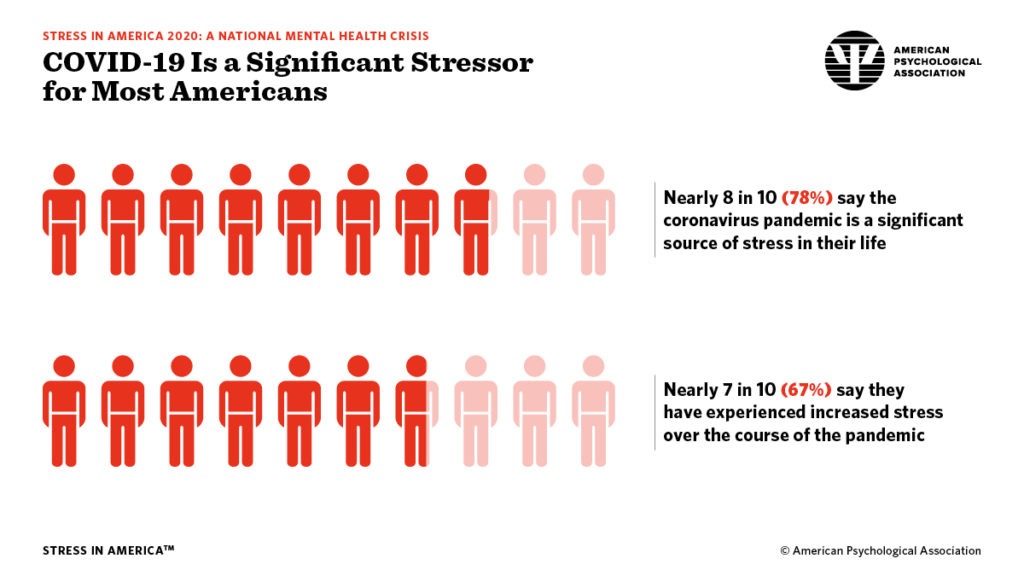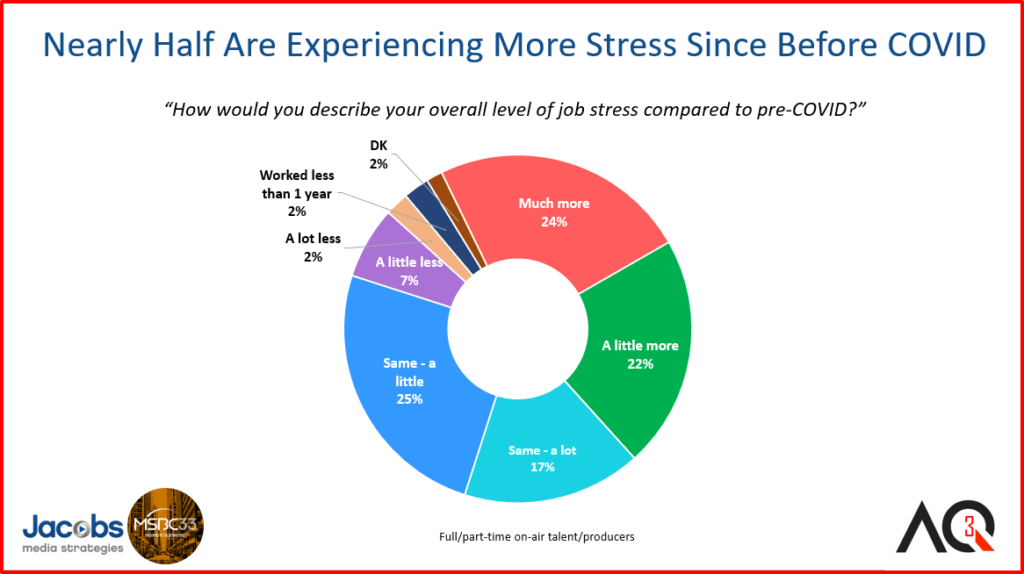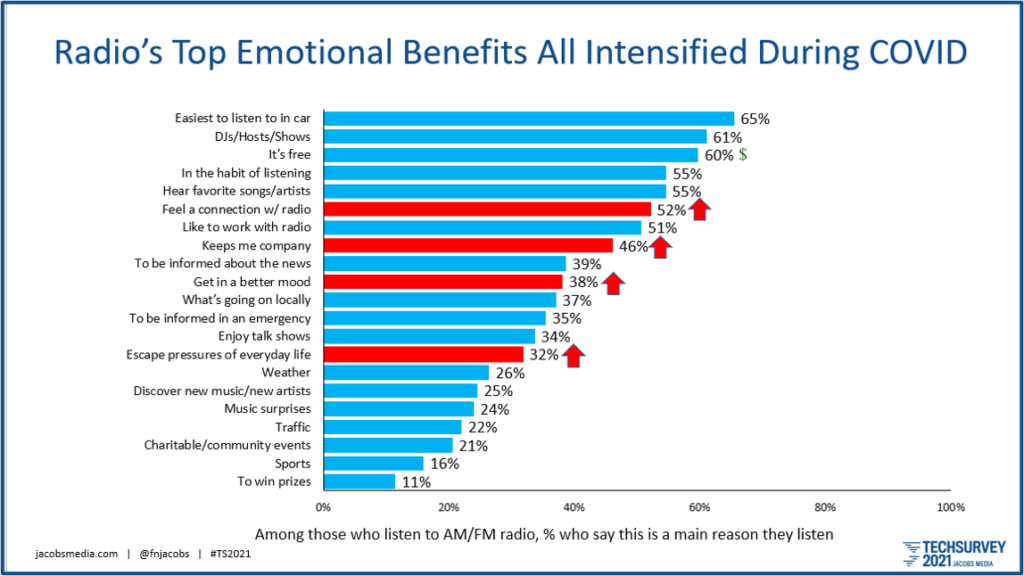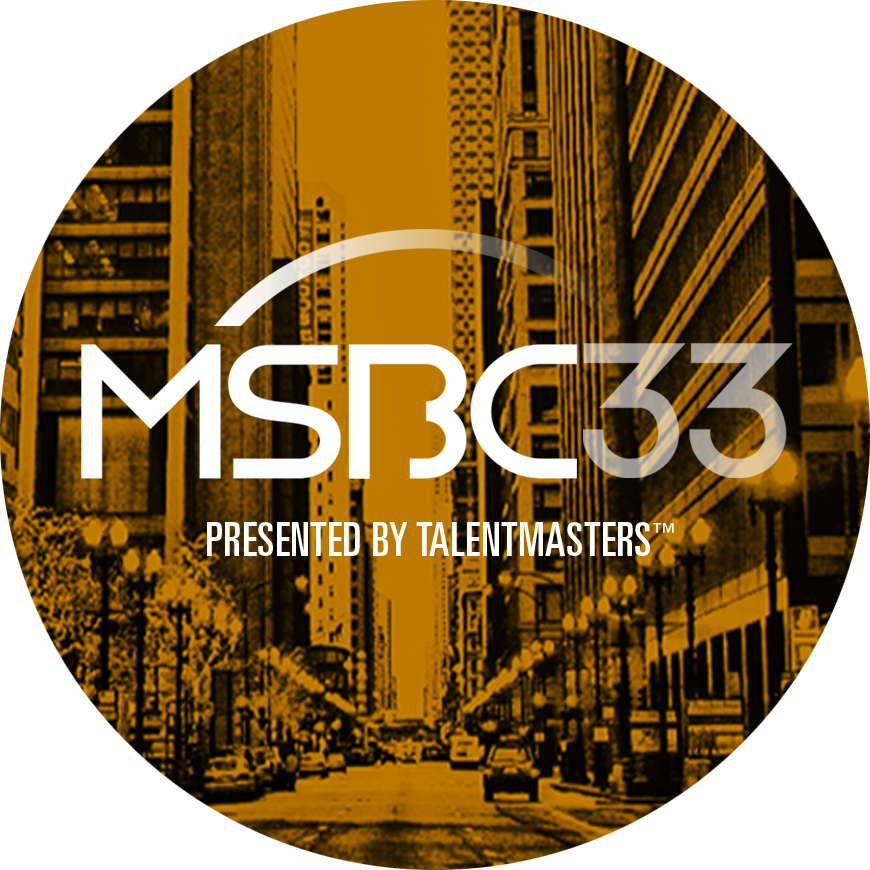
How will we come to think of the last 18 months when we look back at the pandemic over the next several years?
Clearly, 2020 will be remembered as “The Year of COVID.” But the after-effects and reverberations will be with us for years and years to come. Blow-ups among commercial airline passengers are off the charts. Road rage incidents are on track to set a record this year. And nerves are clearly on edge wherever you go.
A new study confirms what you have no doubt suspected – stress levels are nearing an all-time high. It turns out a “Stress in America” study has been conducted by the American Psychological Association since 2007 by the Harris Poll. Just in time to measure the Most. Stressful. Year. Ever.
 As if things weren’t stressful enough, COVID-19 has amplified our fears and our angst, helping keep us all off our games. It’s the not knowing that’s at the root of it for so many of us. None of us has lived through the scourge of a global pandemic before.
As if things weren’t stressful enough, COVID-19 has amplified our fears and our angst, helping keep us all off our games. It’s the not knowing that’s at the root of it for so many of us. None of us has lived through the scourge of a global pandemic before.
Even beyond COVID, there are a lot of sources of stress, but the APA emphasizes how COVID-19 has been a catalyst for millions of us. Anger, mood swings, and acting out are becoming all too common.
The study points out that national issues impacting our country are driving stress levels higher, no matter your particular politics. More than three in four respondents (77%) say worrying about the future of America has amped up their angst.
But some of the everyday pressures are culprits, too. Many of those workplace shootings have been driven by disgruntled and frustrated employees.
Yet, job pressures manifest themselves in ways that aren’t violent, but are erosive to businesses – broadcast radio included.
And the field work for our study among air talent is now completed, and in looking at the data, we can see personalities, hosts, and DJs are feeling the stress.
Here’s a sneak peak of the data I’ll be sharing with hundreds of air talent at Morning Show Boot Camp 33, next month in Chicago:

Those are sobering numbers. Nearly half of our all-talent sample (46%) report more stress since COVID. And when we included those who say their stress levels are consistently high, more than six in ten (63%) report worries around the job that aren’t altogether healthy.
Considering most of these folks got into radio originally because it’s a fun way to make a living, the contrast between then and now is striking – and alarming.
The irony is that for consumers, listening to radio – especially music stations – often serves as an antidote to stress. Back in Techsurvey 2021, we learned that four key emotional drivers for listening to broadcast radio had all increased during the Year of COVID:

Connection, companionship, mood elevation, and escape – all strong reasons why radio continues to be a go-to source. And all higher during the pandemic.
Sadly, the people employed to make the audience feel better – radio talent – are often burdened with the same pressures as the fans they’re paid to entertain. It’s not an easy job when world conditions are good. But when we’re in a prolonged state of roller coaster emotions and intense pressure, owners and operators need to understand how conditions are changed. “The way we’ve always managed” air talent could undergo review.
And that’s why I’m looking forward to making the trek to the Windy City on August 12-13 for Boot Camp. Of course, it will be wonderful to reunite with friends, associates, and clients after all this time.
But it will also be an opportunity for attendees and presenters to compare notes about the most difficult year after, as we work our way back to an equilibrium.
If you’ve never been to Boot Camp, I can tell you this – it’s a close-knit community of excited, motivated personalities who want to learn from each other and get better at their craft. They have each other’s backs because many of them believe no one else does.
It is energizing for guys like me to spend time with them, because they’re a reminder of why we love radio to begin with. Their enthusiasm is contagious and their dedication to their art is impressive.
Stresses and all.
While AQ3 is a research study for and about air talent, I would hope that a few executives will access our summary and analysis, share it with their teams, and make it a part of their strategic plans. In radio, we “test” everything: our music, our topics, our clocks, our contests. But we spend scant time thinking about the health and welfare of our most important asset – our talent.
AQ3 is loaded with findings designed to make us a lot smarter – and hopefully, a little more empathetic. I look forward to sharing it with you.
Info and registration for Morning Show Boot Camp 33 is available here.
- Media And Technology In 2025: Believe It Or Not! - April 18, 2025
- In Radio, You Just Never Know - April 17, 2025
- The Secret To Making A Great Podcast (And Great Radio) - April 16, 2025




Radio and it’s content delivery are tremendously important, especially now. What real broadcasters can do with minimal (if any) added cost is amazing. Radio Renaissance for The New Roaring ’20s!
I’m ready for it, Clark!
Thanks for often reminding radio of the value of empathy toward the staff. I made it job one at every stop on my journey. Didn’t always meant that I kept a job but I sleep better years later for trying.
A great discussion topic for air talent looking back at the year is navigating that mix of honest truth and hope and communal determination. Makes me think of Paul Simon’s song “Tenderness”.
Just give me some tenderness
Beneath your honesty
You don’t have to lie to me
Just give me some tenderness
Agree completely. That’s a large part of what listeners are looking for from us. And as a programmer, it needs to be a greater part of supporting the air staff. Thank you, Paul.
As a person who was a part of commercial radio for 30 years, I’ve seen a lot of changes in our industry. Sadly, in some cases, radio today has a negative perception with today’s listener. I agree with the article, radio talents provide a special bond. Radio can be very personal for a listener. As a jock I would do my best to be a good communicator. I would try and make radio fun and personal. The connection with my listener is what made the show work. In some cases, I was a companion to them, especially in difficult times. In my opinion, radio talent is a very important part of how the station connects with its listener. Upper management should realize that a good station is good because of the creative and talented people who work for it. Doing good radio is not rocket science. All you need is the talent to create and execute good content that can connect with the listener.
Mark, you sound like the kind of guy who was the reason and inspiration for me to get into radio. And I tried to do all you and the others I was listening to taught me when I got there as well. Thanks you. It’s been a great life and I couldn’t have (wouldn’t have) done it without you.